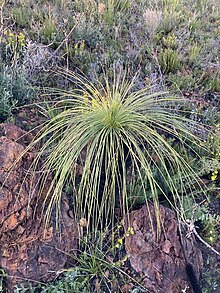| Xanthorrhoea acanthostachya | |
|---|---|

| |
| X. acanthostachya flower-spike | |
| Scientific classification | |
| Kingdom: | Plantae |
| Clade: | Tracheophytes |
| Clade: | Angiosperms |
| Clade: | Monocots |
| Order: | Asparagales |
| Family: | Asphodelaceae |
| Subfamily: | Xanthorrhoeoideae |
| Genus: | Xanthorrhoea |
| Species: | X. acanthostachya
|
| Binomial name | |
| Xanthorrhoea acanthostachya | |
Xanthorrhoea acanthostachya is a species of grasstree of the genus Xanthorrhoea native to Western Australia.[1]
Description[edit]

The perennial grass tree typically grows to a height of 0.8 to 3 metres (3 to 10 ft) with the trunk reaching 1.5 metres (5 ft), scape of 0.5 metres (1.6 ft) and the flower spike to 0.5 metres (2 ft). It blooms between August and December producing cream-white flowers.[1]
Classification[edit]
The species was first formally described by the botanist David Bedford in 1985 as part of the work "Xanthorrhoea acanthostachya (Xanthorrhoeaceae), a new species of the Perth region, Western Australia" as published in the journal Nuytsia.[2][3][4]
Distribution[edit]
It has a scattered distribution along the west coast in the Wheatbelt, Peel and South West regions of Western Australia. It extends from Coorow in the north to Capel in the south where it grows in sandy soils with lateritic gravel.[1]
References[edit]
- ^ a b c "Xanthorrhoea acanthostachya". FloraBase. Western Australian Government Department of Biodiversity, Conservation and Attractions.
- ^ Bedford, D J (1985). "Xanthorrhoea acanthostachya (Xanthorrhoeaceae), a new species of the Perth region, Western Australia". Nuytsia: Journal of the Western Australian Herbarium. 5 (2). Perth, W.A. Department of Biodiversity, Conservation and Attractions: 317–322. ISSN 0085-4417. BioStor BHL
- ^ "Xanthorrhoea acanthostachya (Xanthorrhoeaceae), a new species of the Perth region, Western Australia". Department of Parks and Wildlife. 22 January 1985. Retrieved 16 August 2018.
- ^ "Xanthorrhoea acanthostachya D.J.Bedford". Atlas of Living Australia. Global Biodiversity Information Facility. Retrieved 16 August 2018.